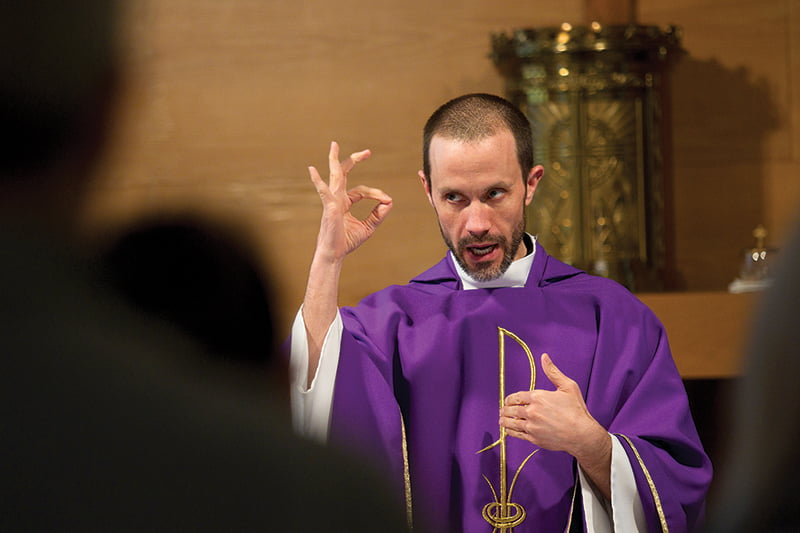
Father Scott Wallisch, chaplain for the archdiocesan deaf community, signs the Mass at Most Pure Heart of Mary Church in Topeka. LEAVEN PHOTO BY JAY SOLDNER
by Susan Fotovich McCabe
Special to The Leaven
KANSAS CITY, Kan. — Seeing is believing. Yet, for the community of people in the Archdiocese of Kansas City in Kansas who are deaf, it’s not enough just to witness the Catholic faith.
And it’s certainly not the same as hearing it, according to Katie Locus, consultant for the archdiocese’s deaf ministry.
Locus, who was born deaf as a result of a virus she contracted while in utero, is the only deaf layperson leading a deaf ministry in the United States. She brings a personal and modern touch to an effort that began in 1955, when the archdiocese appointed a part-time chaplain to the deaf.
By 1974, the archdiocese had appointed Sister Ann Albrecht as the first full-time director for deaf ministry.
“When I started this job, people started telling me about how Sister Ann and [later] Pat Richey impacted their lives,” said Locus. “Sister Ann was the first consultant of this ministry, setting it up in 1974, and literally went door to door to gather the deaf community.”
“At that time, in 1974, there were no laws that required accommodations for anyone with disabilities,” Locus continued, “and that included providing interpreters for the deaf.
“So, oftentimes, deaf people only had one option: go to a Mass that they could not understand.”
Locus said the same was true for catechetical classes. She recalled one woman’s story of not understanding the sacrament of confirmation, even after she had received it. Under Sister Ann’s leadership, the archdiocese began teaching the deaf community about the Catholic faith. Individuals began to understand the importance of the sacraments and their reception.
Today, the deaf ministry has expanded to include Locus’ full-time position, part-time chaplain Father Scott Wallisch and American Sign Language (ASL) interpreter coordinator Joan Macy.
According to Father Wallisch, the deaf ministry is driven to make Catholicism meaningful to the deaf community.
“It’s about helping those who are deaf and hearing impaired to experience Jesus as directly as possible, and to see that he loves them and died for them,” said Father Wallisch.
“A lot of people who are deaf grew up in hearing families,” he explained. “In the past, families didn’t know what to do. Their hearing relatives practiced their faith the way they always had. Those who were deaf had no idea of what was going on.
“If that’s how you are raised, you see the faith, but you have no understanding of why it should be important to you.”
As part of its support, the archdiocese hosts a monthly deaf Mass in Olathe and Topeka, as well as weekly interpreted Masses. (A full list of times and locations is available online).
Additionally, the deaf ministry provides support to a host of other outreaches to the deaf in order to facilitate a rich, Catholic experience.
Father Wallisch has no personal connection to an individual who is deaf. However, he’s been fascinated with sign language since grade school. When he was a seminarian, he began to learn sign language and contacted another priest who had worked with people who were deaf. Today, he signs the entire Mass.
Recently, Father Wallisch, who is also the vocations director for the archdiocese, met with the family of an older woman who was deaf and had passed away.
In discussing her funeral with her family, he learned that it was only in the last five or six years of her life that she was able to experience Mass through a deaf interpreter. According to Father Wallisch, the woman wanted to be a nun when she was younger. She joined a religious order, but only lasted a year because she couldn’t communicate.
“I’ve seen people get involved and excited,” he said. “They go to confession more now than they used to. They’re getting anointed, talking to people at church, attending Bible studies for people who are deaf.”
“I’m excited to make the deaf feel more legitimate,” he said. “I recognize my limitations of not being deaf. So I’m really excited that we have Katie.”
Locus readily admits that being deaf makes communication with the hearing population difficult. However, she believes the experience has made her stronger.
“Isn’t that what our Catholic faith is all about — overcoming challenges to become a better person each day?” Locus asked.






